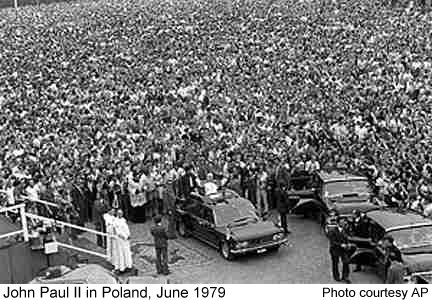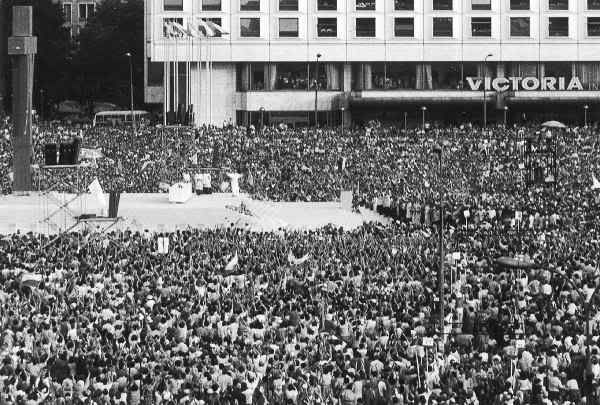"...Why, the pope asked, had God lifted a Pole to the papacy? Perhaps it was because of how Poland had suffered for centuries, and through the 20th century had become "the land of a particularly responsible witness" to God. The people of Poland, he suggested, had been chosen for a great role, to understand, humbly but surely, that they were the repository of a special "witness of His cross and His resurrection." He asked then if the people of Poland accepted the obligations of such a role in history. The crowd responded with thunder.
"We want God!" they shouted, together. "We want God!"

What a moment in modern history: We want God. From the mouths of modern men and women living in a modern atheistic dictatorship.
The pope was speaking on the Vigil of Pentecost, that moment in the New Testament when the Holy Spirit came down to Christ's apostles, who had been hiding in fear after his crucifixion, filling them with courage and joy. John Paul picked up this theme. What was the greatest of the works of God? Man. Who redeemed man? Christ. Therefore, he declared, "Christ cannot be kept out of the history of man in any part of the globe, at any longitude or latitude. . . . The exclusion of Christ from the history of man is an act against man! Without Christ it is impossible to understand the history of Poland." Those who oppose Christ, he said, still live within the Christian context of history.
Christ, the pope declared, was not only the past of Poland--he was "the future . . . our Polish future."
The massed crowd thundered its response. "We want God!" it roared.
 That is what the communist apparatchiks watching the mass from the hotels that rimmed Victory Square heard. Perhaps at this point they understood that they had made a strategic mistake. Perhaps as John Paul spoke they heard the sound careen off the hard buildings that ringed the square; perhaps the echo sounded like a wall falling.
That is what the communist apparatchiks watching the mass from the hotels that rimmed Victory Square heard. Perhaps at this point they understood that they had made a strategic mistake. Perhaps as John Paul spoke they heard the sound careen off the hard buildings that ringed the square; perhaps the echo sounded like a wall falling.The pope had not directly challenged the government. He had not called for an uprising. He had not told the people of Catholic Poland to push back against their atheist masters. He simply stated the obvious. In Mr. Weigel's words: "Poland was not a communist country; Poland was a Catholic nation saddled with a communist state."
The next day, June 3, 1979, John Paul stood outside the cathedral in Gniezno, a small city with a population of 50,000 or so. Again there was an outdoor mass, and again he said an amazing thing.
He did not speak of what governments want, nor directly of what a growing freedom movement wants, nor of what the struggling Polish worker's union, Solidarity, wanted.
He spoke of what God wants.
"Does not Christ want, does not the Holy Spirit demand, that the pope, himself a Pole, the pope, himself a Slav, here and now should bring out into the open the spiritual unity of Christian Europe . . .?" Yes, he said, Christ wants that. "The Holy Spirit demands that it be said aloud, here, now. . . . Your countryman comes to you, the pope, so as to speak before the whole Church, Europe and the world. . . . He comes to cry out with a mighty cry."
What John Paul was saying was remarkable. He was telling Poland: See the reality around you differently. See your situation in a new way. Do not see the division of Europe; see the wholeness that exists and that not even communism can take away. Rhetorically his approach was not to declare or assert but merely, again, to point out the obvious: We are Christians, we are here, we are united, no matter what the communists and their map-makers say.
It was startling. It was as if he were talking about a way of seeing the secret order of the world.
That day at the cathedral the communist authorities could not stop the applause. They could not stop everyone who applauded and cheered. There weren't enough jail cells..."


No comments:
Post a Comment